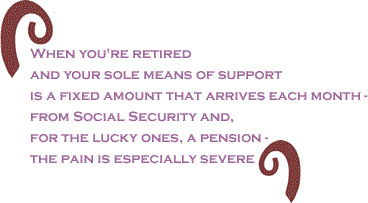
|
||||||||||||||||||||||
 |
||||||||||||||||||||||
 |
||||||||||||||||||||||
 |
||||||||||||||||||||||
 |
||||||||||||||||||||||
 |
||||||||||||||||||||||
 |
| The current issue is always free to everyone |
|
|
 |
He caught me by the elevator. “Do you know
how much peanut butter costs at Safeway now as compared to
two months ago?” John asked. I didn’t but I had been aware
of the recent cost of berries, which were rising out of sight.
Joe wanted to know if I had, as requested, written to one
of our “Those same costs are squeezing the estimated
20,000 senior nutrition programs across the country that serve
Jones and millions of elderly and frail Americans” the AP
story read. “While most needs are still being met, advocates
from
“Nearly all Americans have felt the sting of inflation in recent months. But when you're retired and your sole means of support is a fixed amount that arrives each month - from Social Security and, for the lucky ones, a pension - the pain is especially severe. “Until recently, many retirees had assumed they had enough income to retire on. That was before gas and food prices began racing out of control.” Then last Saturday, the seniors’ plight made
the front page of the New York Times. “Faced with soaring
gasoline prices, agencies around the country that provide
services to the elderly say they are having to cut back on
programs like Meals on Wheels, transportation assistance and
home care, especially in rural areas that depend on volunteers
who provide their own gas. “Public agencies of all kinds are struggling with the new math of higher gas prices, lower property and sales tax revenues and increases in the minimum wage, noted the Times story, adding, “But older poor people and those who are homebound are doubly squeezed by rising gas and food prices because they rely not just on social service agencies, but also on volunteers.” When I forwarded that story Saturday morning, another senior group board member responded within minutes, “It makes you want to cry.” That the national media has taken notice of seniors’ special plight amid the deepening economic crisis is to be welcomed. I cite the articles because not everybody will see them. They do confirm and put an added sense of urgency to something most of us are aware of in any case. You don’t have to travel far from home to hear stories of the working class elderly trying to cope in trying times.
Bread isn't the only Meals on Wheels scarcity these days. Drivers are needed, too. During the summer, volunteer drivers deliver the meals and supply their own cars and gas. Randy Barrett, director of Cascade County Aging Services, which oversees Meals on Wheels, told the Tribune he’s worried about how some seniors will be able to afford home heating when winter comes. “If you're on a fixed income, you're on a fixed income,” he said. It’s not just that food banks and nutrition programs are being cut back; it’s also that this is occurring at a time when the need for them is increasing. Seniors are today being hit hard from a number of directions. It starts at the top. While the cost of waging war abroad continues to soar, the Bush Administration and the all-too-ready-to-compromise Congress are taking steps to reduce expenditures on social services across the board, even as the need for them grows. Meanwhile, under the impact of declining tax revenues – much attributed to the housing mortgage crisis - and increasing costs, states, cities and counties are cutting back on a range of senior services and health related programs. Then there is the mortgage crisis itself. A lot of people who are no longer in the workforce have relied on what they had built up in their home equity to guarantee them a relatively secure retirement. For many that assurance has now flown out the window in the face of the downward cascade in home prices. Many are stuck with houses that are worth less than the mortgages held on them and a hundreds of thousands are facing the threat of bank foreclosures. According to the government, women and men over 55 have the highest rate of home ownership – about 80 percent.
“We are looking at a generation approaching retirement that has taken a very hard hit. They counted on the equity in their homes and it is not going to be there,” Dean Baker, co-director at the Center for Economic Policy and Research, said recently. There is the rising cost of healthcare, a particularly
hard row to hoe for seniors, even for those on Medicare. It
still costs, and too often there is a conflict between paying
the medical bills, heating the house and eating. “I have one
friend that really bothers me.” No, it shouldn’t. Keep in mind that this tragedy is happening in the wealthiest nation on the planet. There are ample resources to prevent it entirely and quickly. Today, vast fortunes are being amassed by those on top and wealth disparities grow. The 2008 election campaign lumbers on, spending a lot of time talking about things that are mostly inconsequential in the larger scheme of things. Meanwhile, many seniors – somebody’s moms or dads – are finding it difficult to secure food and services and are facing the possibility of shivering through the winder, No, it shouldn’t be this way. BlackCommentator.com Editorial Board member Carl Bloice is a writer in |
Any BlackCommentator.com article may be re-printed so long as it is re-printed in its entirety and full credit given to the author and www.BlackCommentator.com. If the re-print is on the Internet we additionally request a link back to the original piece on our Website. Your comments are always welcome. eMail
re-print notice
If you send us an eMail message we may publish all or part of it, unless you tell us it is not for publication. You may also request that we withhold your name. Thank you very much for your readership. |
|
| July
10, 2008 Issue 285 |
|
| Executive Editor: Bill Fletcher, Jr. |
| Managing
Editor: |
| Publisher: Peter Gamble |
| Est. April 5, 2002 |
| Printer Friendly Version in resizeable plain text format or pdf format. |
 |
 |
 |
| |
| |






















 Meanwhile,
USA Today has run an extensive series on the problems
of seniors struggle to remain alive and healthy under the
crushing weight of the cost of the things we need and for
which the elderly must pay a disproportionate share of our
incomes on. One of them described a busy food bank in
Meanwhile,
USA Today has run an extensive series on the problems
of seniors struggle to remain alive and healthy under the
crushing weight of the cost of the things we need and for
which the elderly must pay a disproportionate share of our
incomes on. One of them described a busy food bank in 
 Nancy
Wilson, program manager of Meals on Wheels in
Nancy
Wilson, program manager of Meals on Wheels in 








